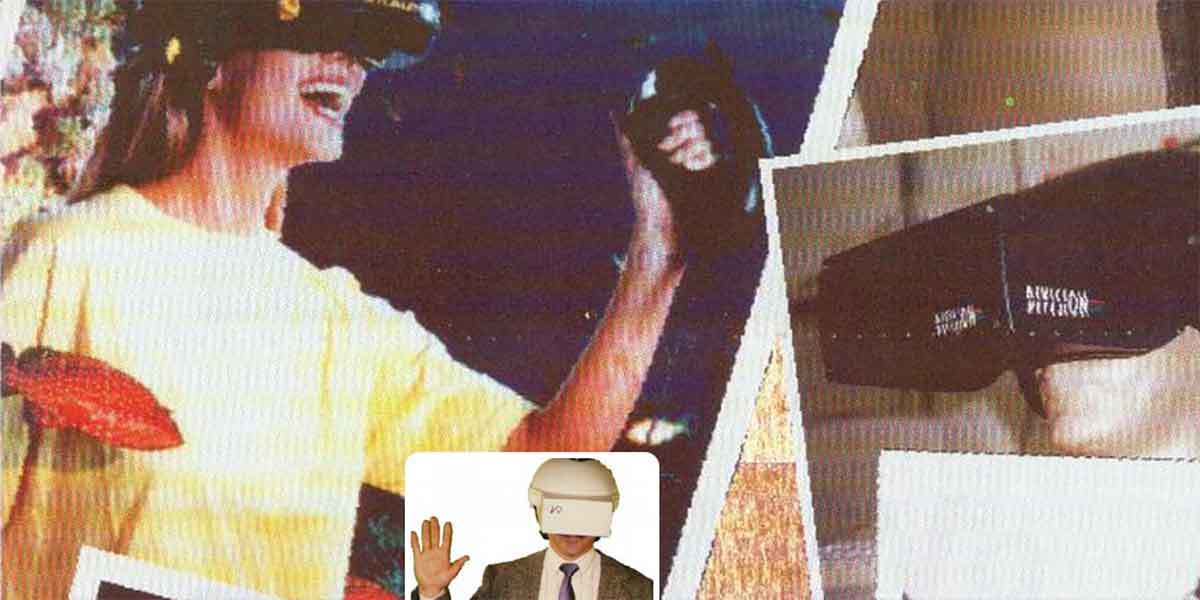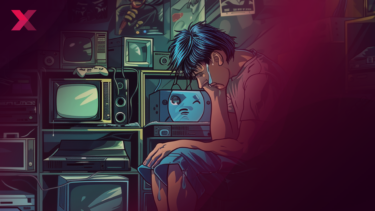Virtual-Reality-Industrie: "Wir machen genau die gleichen Fehler wie in den 90er-Jahren"

Ben Delaney war von 1990 bis 1996 Journalist für das Virtual-Reality-Magazin CyberEdge. Währenddessen und danach hat er über viele Jahre hinweg als Berater für die VR-Industrie gearbeitet. 2014 veröffentlichte er das Buch Sex, Drugs and Tessellation: The Truth About Virtual Reality, in seinem Blog und auf Twitter äußert er sich noch zu aktuellen Themen. Wir wollten von Ben wissen: Was lief damals genau schief? Und warum ist es heute anders? Click here for the english version of the Interview with Ben.
Ben, wie sicher wart ihr euch in den 90ern, dass Virtual Reality die nächste große Sache wird?
Wir waren uns mindestens genauso sicher wie die Menschen heute. Seit ich 1990 die erste VR-Demo gesehen habe, war für mich klar, dass diese Technologie das Potenzial hat, unseren Umgang mit Computern grundlegend zu ändern. Die Demos waren plump, aber das Potenzial offensichtlich groß.
Jetzt wissen wir: Das hat nicht geklappt. Aus der heutigen Sicht war das offensichtlich, weil die Technologie nicht ausgereift war. Zu groß und umständlich, zu teuer, die Inhalte waren das Geld nicht wert. Welche Gründe habt ihr damals für das Scheitern identifiziert?
Da stimme ich zu. Die Technologie war unzulänglich und viel zu teuer. Aber nach einigen Jahren, Mitte der 90er, waren die Kosten nicht mehr das entscheidende Problem. Stattdessen kämpften wir mit einem Problem, mit dem wir heute immer noch kämpfen: schlechte Inhalte. Es gab einen klaren Gewinner, die 3D-Spiele, die leider zu 90 Prozent aus Ego-Shootern und anderen sinnlosen Zeitverschwendern bestehen. Über die Anwendungen, bei denen Virtual Reality wirklich Nutzen stiften könnte, wird nicht mehr berichtet, also beispielsweise Apps für Training, Diagnostik, Remote-Operationen und viele andere Möglichkeiten interaktive 3D-Interfaces sinnvoll zu nutzen.
[blockquote cite="Ben Delaney"]Wie auch immer, ich denke, dass Virtual Reality kein großer kommerzieller Erfolg im Endkundenmarkt wird. Niemand wartet darauf, es löst keine großen Probleme und die Technologie steht der Erfahrung immer noch im Weg.[/blockquote]Nicht zu vergessen sind die unausweichlichen Klagen, wenn jemand sein Auto kaputt fährt oder die Treppen runterfällt und dabei eine kabellose VR-Brille trägt. Da werden einige kleinere Unternehmen wieder vom Markt verschwinden.
Gibt es eine Blase, die bald platzt?
Virtual Reality war immer ein Thema und wird es auch bleiben. Aber ich sehe schon die Möglichkeit, dass sich gerade eine Blase bildet, die in ein paar Jahren platzt. Die Software, die wir aktuell sehen, ist immer noch schwach. Ich glaube nicht, dass Menschen dazu bereit sind abendfüllende Unterhaltungsangebote mit einer Brille auf dem Kopf anzuschauen, darauf hatten sie schon bei 3D-TVs keine Lust. Vielleicht mit der Ausnahme von immersiven Sportübertragungen, die in VR sehr cool sind.
Wirklich sinnvolle Anwendungen sind dagegen ein Thema, das immer wichtiger werden wird. Meiner Meinung nach werden die wirklich relevanten VR-Apps aus diesem Bereich kommen. Auch interessant sind Interfaches im Kontext von Big Data.
Siehst Du irgendwelche Parallelen zu den 90ern?
Parallelen zu den 90ern? Alles ist wie in den 90ern! Niemand kümmert die Fehler, die schon gemacht wurden und was daraus gelernt wurde. Ich sehe genau dieselben dummen Erwartungen, haltlose Vorhersagen und den gleichen schlechten Inhalt, diesmal eben mit viel besserer Bewegungserkennung und in hoher Auflösung. Aber hoch aufgelöster Müll ist immer noch Müll.
[bctt tweet="Alles ist wie in den 90ern: Niemand interessiert sich für die Fehler von damals. #VirtualReality"]Sind Oculus Rift und Co. nicht sowas wie eine Vision, die plötzlich Realität wird?
Ich habe ab einem gewissen Punkt das Interesse verloren und auch jetzt komme ich wieder an einen Punkt, an dem ich das Interesse verliere. Es fühlt sich an wie ein Déjà Vu und ich habe kein Interesse daran, die 90er erneut zu durchleben und zuzuschauen, wie die gleichen Fehler wiederholt werden, diesmal von Menschen mit mehr Tattoos aber weniger Ahnung vom Kontext in dem sie leben und arbeiten.
Ich weiß, ich klinge wie eine Spaßbremse, aber ich bin extrem enttäuscht über die fehlende Aufmerksamkeit fürs Detail, dass Menschen Entwicklungen ignorieren, die den heutigen Stand der Technologie überhaupt erst möglich machten, und die Beharrlichkeit, mit der die gleichen Fehler wiederholt werden - nur mit neuer Hardware.
Es ist eine gewisse Genugtuung, dass jetzt viele der Vorhersagen der 90er Jahre umgesetzt werden. Allerdings beziehe ich das explizit auf die Hardware, die sich enorm verbessert hat und dabei um ein Vielfaches günstiger geworden ist. Extrem enttäuscht bin ich von der bisher gezeigten Software und wie oberflächlich über virtuelle Realität nachgedacht wird.
Im Moment gibt es viele verschiedene virtuelle Technologien, die in den kommenden Monaten verkauft werden sollen. VR-Brillen wie Oculus Rift, AR-Brillen wie Google Glass und Ansätze mit holographischen Abbildungen wie bei Hololens. Virtual, Augmented oder Mixed Reality - was hat das größte Potenzial?
Ich glaube nicht, dass Hololens irgendwas mit Hologrammen zu tun hat, ausgenommen der Produktname. [blockquote cite="Ben Delaney"]Ich denke im Konsumentenmarkt haben Augmented-Reality-Apps das größte Potenzial, da sie wirklich nützliche Vorteile bieten können.[/blockquote]
Vollständige Immersion in Virtual Reality wird im Konsumentenbereich eher die Ausnahme bleiben, aber dafür ein wichtiges Werkzeug für die professionelle Arbeit in vielen Branchen. Eine Ausnahme gibt es: Virtual-Reality-Sex hat riesiges Potenzial. Teledildonics haben noch immer die Aufmerksamkeit der Leute gebunden.
[bctt tweet="Interview mit Ben Delaney, VR-Journalist aus den 90ern. #virtualreality"] [section label="english"]English Version: Interview with Ben about the current state of the VR-Industry
[toggles behavior="toggle"] [toggle title="Click here to read"]Back in the 90s, how sure was the industry/how sure were you that VR would take off and that it is "the next big thing"?
We were at least as sure as people are today. It was obvious to me form the first time I saw Virtual Reality demoed, in 1990, that this was a technology with the potential to change how we use computers. The demos were crude, but the potential was obviously huge.
MIXED.de ohne Werbebanner
Zugriff auf mehr als 9.000 Artikel
Kündigung jederzeit online möglich
Now we know that VR didn't take off. From our perspective today, it didn't because the technology just wasn't there. Too bulky, to pricey, the experience not worth the money. Which reasons did you guys discuss back then?
I agree with your assessment. The technology was inadequate, and far too expensive. But, after a few years, by the mid- to late-90’s, the cost ratio was quickly becoming less of an issue, and the issue that arose are what we still deal with today – the content, by and large, really sucked. The only clear winner is 3D gaming, which unfortunately, is about 90% first person shooters and other mindless time-wasters. The apps where VER can really contribute aren’t in the news anymore, but training, diagnostic applications, remote operations, and many other ways of using interactive, 3D interfaces are slowly coming to the fore. However, I personally believe that Virtual Reality is unlikely to be a large commercial success in the consumer market. No one is clamoring for it, no great problems demand it, and the technology is still getting in the way. Not to mention the inevitable lawsuits that will decimate some of the smaller companies when some idiot wrecks a car or falls down stairs while wearing a wireless HMD.
Do you think that this time virtual reality is here to stay? Are we safe yet or could it be just another bubble about to burst?
Virtual Reality never went away, so of course, it’s here to stay. At the same time, I see even odds that the current bubble will burst in a few years. In my opinion, most of the apps we see are stupid. I do not believe that people will watch long-form entertainment in HMDs, any more than they were willing to watch 3D TVs. (One possible exception is sports, which seem to be really cool in immersive 3D.) At the same time, the serious apps never went away, and will only become more important. In my estimation, the real apps will be the ones I mentioned above, plus many sorts of big-data interfaces.
Any dangerous parallels you can see compared to the 90s?
Parallels to the 90’s? All of it. No one cares about the mistakes already made and the lessons learned. I see the same dumb expectation, the same baseless predictions, and the same idiotic content, though with far better tracking and much higher visual resolution. But high-res garbage is still garbage.
Were you invested in VR and AR over all these years? In that context, how does it feel for you to see and use Oculus Rift or HTC Vive. Is it like a personal dream of yours come true or is it still lacking in your opinion?
I pretty much lost interest, and I am losing interest again. It feels like déjà vu to me, and I am not interested in living in the past, or seeing the 90’s replayed by people with more tattoos and less understanding of the context in which they live and work. I know I sound like a curmudgeon, but I am vastly disappointed in the lack of attention to detail, the ignorance of the people for events that enabled today’s technology, and the insistence on making the same mistakes, though with new hardware.
The is a slight satisfaction in seeing many of the predictions of the 90’s finally realized. However, that satisfaction is almost entirely in the hardware, which has improved hugely, while costing orders of magnitude less. My disappointment in the foolishness of the apps being proposed and the shallowness of much of the thought on VR these days is huge.
What do you think will be the most successful virtual tech? VR like Oculus, AR like Google Glass (if it's actually useful one day) or holographic technology like HoloLens? Or will it all just blend into mixed reality anyway?
I don’t believe there is anything holographic about Hololens other than the name. I believe the most likely consumer-grade success will be in AR apps, which have many obviously useful opportunities. I think full-immersion Virtual Reality is going to remain a novelty at the consumer level and an increasingly important tool in professional work of many types. One exception: Virtual Reality sex, which has huge potential. Teledildonics has always held people’s imaginations.
[/toggle] [/toggles] [mashshare]Hinweis: Links auf Online-Shops in Artikeln können sogenannte Affiliate-Links sein. Wenn ihr über diesen Link einkauft, erhält MIXED.de vom Anbieter eine Provision. Für euch verändert sich der Preis nicht.




